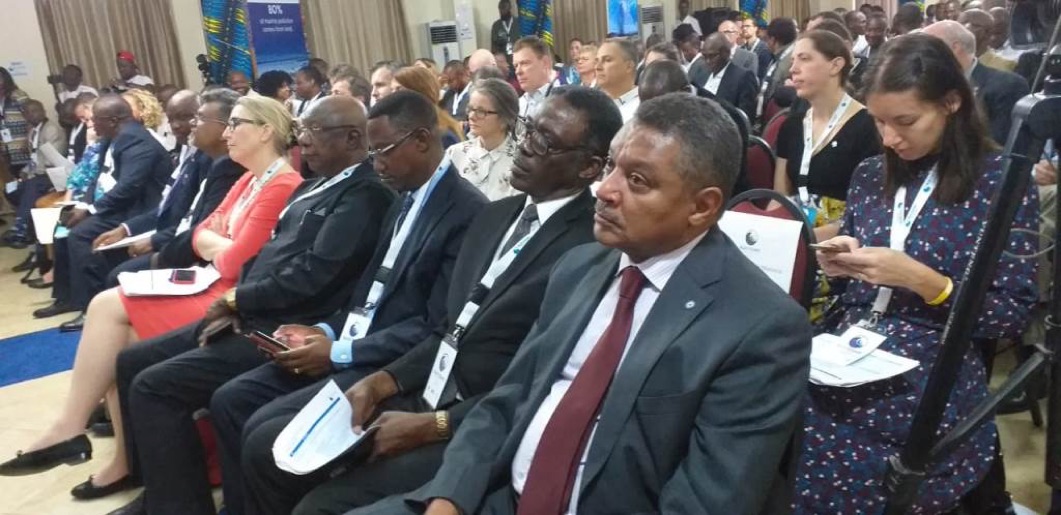MONROVIA, Montserrado – Efforts are underway to conserve and enhance Liberia’s ecosystem services by attaching value to its oceans. For years, oceans in the country have been unappreciated, and its services taken for granted, like in most countries across Africa.
Stakeholders at a recent Blue Ocean conference organized by the government, the Sweden Embassy in Monrovia and Conservation International adopted several recommendations aimed at preserving the coastal and ocean environments, strengthening partnerships for development, to help end poverty, and enhance maritime viability for prosperity.
The event marked the country’s first high-level West Africa Blue Oceans Conference and took place between February 18 and 21, 2019 in Monrovia. It brought together civil society organizations, technical institutions and members of the business community.
Recognizing among other things the important role of oceans to human survival, poverty reduction, food security and nutrition, and sustainable livelihoods, as well as climate resilience, maritime trade, and transportation, the stakeholders made a 12-count recommendation where they called for the adherence to the 2050 Africa’s Integrated Maritime Strategy. The strategy consists of the overarching, concerted, and coherent long-term multilayered plans of actions that will achieve the objectives of the A.U. to enhance maritime viability for a prosperous Africa, and contribute to the success of the U.N. 2030 Agenda and the Sustainable Development Goals.
They recommended actions for strengthening governance mechanisms for a sustainable coast and ocean, including those for sustainable fisheries, climate change, marine pollution, and blue economy, and ensuring stakeholder participation in policy and decision-making, as well as to develop all-inclusive strategies to raise awareness by decision makers of the natural and cultural significance of the ocean, opportunities and challenges, and the need to further improve a collective knowledge of the ocean.
Reading the recommendations at the close of the conference, a researcher at Queen’s University in Belfast and marine fellow at Conservation International, Sheck Sheriff said the stakeholders called for support for plans to develop ocean-related education, including courses at various levels in universities and colleges across the country, to promote ocean literacy and a culture of conservation and sustainable use of the ocean.
“Promote the role of women in the blue economy and identifying challenges and opportunities to further empower women and encourage their role in positions of leadership and recognize that gender equality and empowerment of women will improve the social and economic well-being of the society,†Sheriff read.

Sheck Sheriff reading the recommendations at the Blue Ocean Conference. Photo: Zeze Ballah
The stakeholders called for actions to enhance sustainable fisheries management through science-based management measures, an ecosystem-based approach, monitoring, control, and surveillance, as well as strengthening cooperation through regional fisheries management organizations and regional fisheries bodies. They want action to put an end to and mitigate destructive and unsustainable fishing practices by stopping illegal, unreported, and unregulated fishing, effectively implementing the port state measures agreement and increasing the number of countries who have ratified the agreement.
“Better recognize and measure the role of small-scale fisheries in Liberia and the region’s sustainable development, through an increased collection of data, implementation of the principles in the Voluntary Guidelines for Securing Sustainable Small-Scale Fisheries into national laws and regulations, and enhanced monitoring and enforcement,†the recommendations continued.
“Improve and promote work to strengthen cooperation on the development of catch documentation schemes and traceability of fish and fish-related products.â€
They further stressed the need for increased capacity building and technical assistance to small-scale fishers, to improve their access to marine resources and markets to improve the socio-economic situation of fisher folks, their families and communities.
They said the government must also ensure that future fishing agreements with external countries or other parties are grounded in science-based approaches which secure the sustainability of fish stocks and prioritize the equitable distribution of benefits between countries and stakeholder groups.
The recommendations were concluded by a call to address social responsibility issues within the seafood sector, including protecting human rights and dignity and respecting access to resources, ensuring equality and equitable opportunities to benefit, and improving food and livelihood security.
Featured photo by Zeze Ballah


